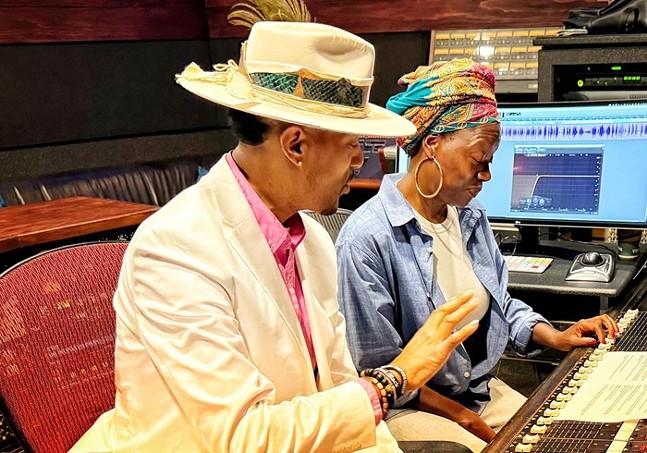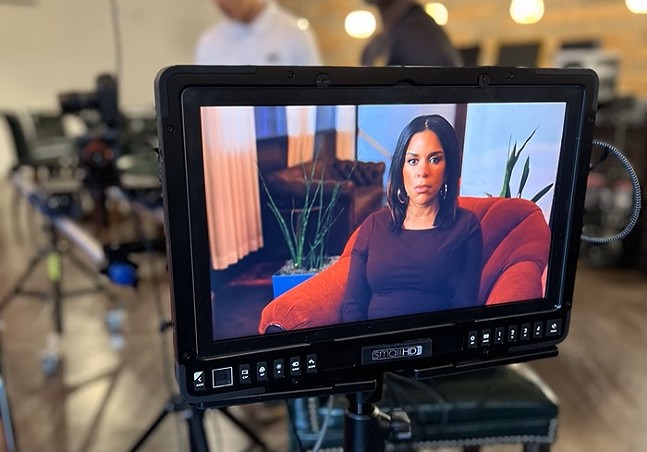Emmy Award-winning Pittsburgh filmmaker Emmai Alaquiva decided to use his art to create awareness and fight for change around this issue. The result is The Ebony Canal, a new documentary premiering on Fri., July 19 at the August Wilson African American Cultural Center.
"I wasn't the individual that would carry the protest signs and things of that nature," Alaquiva tells Pittsburgh City Paper. "The way I utilized my voice was through the creative sector, through photography, and through cinematography."
The inspiration for The Ebony Canal came from a deeply personal place when Alaquiva was moved by the need to explain the death of George Floyd to his young daughter.
"I've always been an artist that has been enamored with the pursuit of justice, the pursuit of advocacy and allyship, starting back in 2020 with the unfortunate demise of George Floyd," he says.
This moment of parental duty sparked a journey into the world of Black maternal health, a sector fraught with alarming statistics and heart-wrenching stories.
Alaquiva's previous work, including the 2022 exhibition OPTICVOICES: Mama's Boys, helped to lay the groundwork for this new endeavor. Similarly, OPTICVOICES: Mama's Boys provided an interactive, mixed-media experience orbiting the healing of mothers who lost their sons to systemic violence. Using "love letters" in the form of photography, film, and augmented reality, the project's goal was to secure a positive legacy for the sons taken from them too soon.
Social media played a crucial role in The Ebony Canal's development. A call-out for participants yielded an overwhelming response. Alaquiva was able to find four soon-to-be mothers who allowed him to document their upcoming pregnancy journey.
The four women chosen to be featured in the film — Mariah Peoples, Rachel Strader, Alana Yzola-Daly, and Larissa Lane — had their pregnancies documented through doctor's appointments, home life, delivery, and even first birthdays. Alaquiva got VIP access to moments that sometimes even the mothers missed.
"As the individual documenting this journey, you see such a beauty from a lens that no one else sees. You know, the way a father touches the mother's hand or the way a mother's forehead connects with a doula," Alaquiva explains. "You see all these little, small nuances that you really don't understand until you understand it through a different lens."
The emotional weight of the project is palpable, especially given that not every baby survived. This harsh reality underscores the dire need for change in Black maternal healthcare. Rather than moving past the pain, Alaquiva moved through it, focusing on solution-driven storytelling. This approach is evident in the film's narrative, which balances the harsh realities of Black infant mortality with moments of joy and resilience.
After sharing so many intimate moments with the women and their families, it's no surprise that the director formed an everlasting bond with his subjects.
"There's something that takes over you when you take this type of journey with another human being," Alaquiva continues, "You do become like an uncle, you do become family, and you do have a connection that will never change. You'll never be able to break that type of bond."
In telling these stories, it was vital to Alaquiva that the documentary go beyond statistics and medical jargon. He was determined to transfer clinical data into a cultural narrative. The film includes interviews with doctors and experts, but at its core, finds the human connection to the women who have lived and are living in this reality.
After bearing witness to the struggles these women endured, the filmmaker came to the realization, "Who am I to complain about anything against what Black and Brown mothers and birthing folks have been through?"
The filmmaker, recently promoted to vice chair for the PA Council on the Arts, also got a helping hand from Hollywood — Pittsburgh-born film and television actor Lamman Rucker is featured, and EGOT recipient Viola Davis narrates the film.

Photo: Courtesy of Emmai Alaquiva
The Ebony Canal director Emmai Alaquiva (left) behind the scenes with Viola Davis
"I had an incredible producer who helped to put it in front of her," says Alaquiva. "When I was in a studio with her, I mean, I couldn't believe it. The whole entire time, I could not believe that this kid from Wilkinsburg was in the studio in Los Angeles, California, with an EGOT winner."
The upcoming premiere at the August Wilson African American Cultural Center promises to be a powerful gathering of voices, including the mothers featured in the film, Rucker, and medical experts. Proceeds from the event will go to nine organizations that focus on Black maternal health.
The screening serves as a call to action, emphasizing the filmmaker's mission to create purposeful work that drives meaningful change.
"My mission as a cinematic poet is to crystallize the human spirit through cinematic and purposeful storytelling," says That's what I do with every single project. That's my whole mission."
The Ebony Canal. 6-10 p.m. August Wilson African American Cultural Center. 980 Liberty Ave., Downtown. $9. awaacc.org



